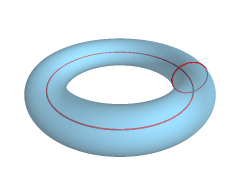|
(2015
midterm assignment) Model Student Midterm answers 2015 (Index) Essay 2: Personal / professional topic |
 |
Michael McDonald
Visions
One of the things that I’ve always enjoyed about science fiction is that
the possibilities for it appear limitless. Science fiction is allowed to play
with the past, present a possible future, and show mankind’s impending doom. As
I stated in my previous essay, science fiction always led me to ask what if?
Science fiction had always to me led to the basic questions of what if, and how
I would be effected in I was suddenly plunged into the pages that I read.
For me the alternate histories/futures narrative intrigues me the most. Wells
description of a distant future affected solely by the possibility of a changing
political ideology leads me to wonder what is held for our own future just a few
years down the road. What are the possibilities that await us? With the infinite
possibilities that await us I am too reminded of the evolutionary narrative.
Evolution to me was a common theme of science fiction, but it was not the slow
time consuming evolution that science equates with the growth of mankind.
Instead I’ve found that science fiction tends to bind the possibilities of the
past and future, with the modern advances of mankind.
William Gibson’s short story, “The Gernsback Continuum” combines the two
narratives in a unique way. Instead of taking his audience into the future to
see what the world will become, or returning to the past to change the present,
Gibson allows his protagonist to exist within his own present time and the
present of a time that had passed them by. In these visions into, as I like to
refer to it, “Earth 2” the narrator sees “the children of Dialta Downes's `80-
that-wasn't; they were Heirs to the Dream” (50 Gernback). The narrator is
existing within two worlds simultaneously, he is solidly in his own present
time, but is haunted by the visions of a world that had long ago passed by
without the chance to take root. When the narrator see the city of Tucson he
does not see the city that he recognizes instead he sees a sleek spire like
metropolis (49).
The idea of infinite possibility and potential to shape the world with every
decision we as mankind make, to me appear as an important topic of discussion.
We can approach stories like Gernsback not only asking, what the hell is going
on, but also look into the story and ask what happened in our time that kept
this from becoming our reality? In reading Gernsback I regarded the “Earth 2”
visions that the narrator had, as the visions of a world where Hitler came to
rule and his “perfect world” came to fruition. In Well’s
Time Traveler though, Wells addresses
his fears of the communist party and the potential it could hold for the distant
future. Rather than presenting a possibility that occur in an alternate world,
Wells focuses on the possibilities that will be left to unfold in his world.
Science fiction allows its audience to immerse themselves into potential and
possibility. For me that is what the essence of science fiction is, potential
and possibility. The narratives of science fiction allow for writers to toy with
those two ideals. It is potential and possibility of science fiction that again
leave me asking, what if?
 |
 |
 |
